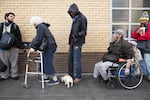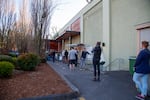The coronavirus outbreak has upended daily life with drastic shifts in the last month: restaurants and schools are closed, unemployment claims continue to increase, and many people are staying home to prevent further spread of the virus.
But as we try our best to adjust to this new normal, there are still safe ways to help the people around us in trying times. Here’s how you can lend a hand to a neighbor in need.
Help people access the food they need
Food banks are in desperate need of donations and volunteers as the demand for food has dramatically increased amid the coronavirus outbreak. People with limited finances are struggling to put food on the table, and older and vulnerable volunteers are following directions to stay home to protect their health.
The Oregon Food Bank and its food pantry sites are seeking donations and volunteers as demand grows throughout the state. Their network includes 21 regional food banks and more than 1,400 food assistance sites around the state. Volunteers 60 and older who are at-risk of contracting COVID-19 have been encouraged to stay home and choose other ways to contribute. You can donate or sign up for an individual volunteer shift here.

People stand in line outside of Blanchet House, a homeless service provider in Old Town Chinatown. The nonprofit has seen demand rise and donations plunge.
Jonathan Levinson / OPB
Blanchet House of Hospitality in Portland is serving free hot meals in Northwest Portland to those in need. You can donate and sign up to volunteer here.
Clark County Food Bank is a regional food bank serving food in Southwest Washington. You can donate and sign up to volunteer here.
Lift UP helps serve low-income residents in the Northwest/Downtown Portland area with their food needs. You can sign up to volunteer here.
Metropolitan Family Service helps serve east Portland residents at their five food pantry locations. You can donate and sign up to volunteer here.
Neighborhood House is a local social service agency that's providing meals, masks and distance learning to members of the Portland community, and is supporting homebound seniors amid the crisis. You can donate to their COVID-19 response fund here.
Partners for a Hunger Free Oregon is seeking donations to provide meals for students out of school. You can find a list of participating school districts here.
St. Vincent de Paul helps provide food, clothing and transitional housing to those in need with sites across the Northwest. You can donate to the Bend location, or look up the site serving your community.
Sunshine Division helps provide free accessible food and clothing assistance to Portland-area families and individuals. You can donate here.
Check with the food pantry in your area to see how you can best donate and volunteer. Some pantries in the region:
- Astoria, Clatsop County
- Beaverton
- Bend
- Corvallis
- Eugene
- Grants Pass
- Gresham
- Hillsboro
- Hood River
- Keizer
- Klamath Falls
- Medford
- Ontario
- Pendleton
- Portland
- Salem, Marion and Polk County
- Seaside
- Southwest Washington
Shop for homebound seniors and other vulnerable people
While some grocery store chains are offering special hours for seniors and the immunocompromised, many people are isolating at home for their safety. Here are some ways you can deliver goods to someone who's staying home to stay safe.

Shoppers stand in line outside Whole Foods in Portland, Ore., on Thursday, March 19, 2020. Grocery stores around the region have implemented social distancing guidelines during the new coronavirus pandemic, such as making customers stand 6 feet apart and limiting the number of people inside.
Claudia Meza / OPB
The COVID Response Collective in Corvallis has developed a network of helpers in Benton County and the greater Northwest for delivering supplies and connecting people to resources. You can sign up here.
Meals on Wheels People is a nonprofit that helps buy, cook and deliver meals for homebound seniors. CEO Suzanne Washington told OPB's "Think Out Loud" that the demand for meal deliveries is rising sharply as more seniors stay at home for their safety.
“That number is going up every day. Our challenge at this point is that we can produce enough meals as we add people,” Washington said. You can donate or sign up to volunteer here.
The Lane County Mutual Aid Network has set up an online group to connect people who need groceries, deliveries, childcare and more. Find the group on Facebook.
The PDX COVID-19 Mutual Aid Network has set up a volunteer form for those who can help deliver supplies and groceries in the Portland area. You can sign up here.
Store to Door delivers groceries to Portland-area homebound seniors and people with disabilities, and is looking for volunteer shoppers and drivers for safe limited- and no-contact deliveries.You can sign up to be a volunteer grocery shopper or delivery driver here.
Many other online neighborhood groups are organizing shopping initiatives for the elderly or the immunocompromised. Visit your neighborhood group on Facebook or Nextdoor to see if you can join an effort there.
Donate blood and plasma
While a majority of blood donations usually come from group blood drives, COVID-19 has caused the cancellation of thousands of blood drives around the Northwest. The Red Cross is seeking more donors to meet the constant need for blood.
“As we add more appointment slots and blood drive opportunities in the coming weeks, we ask that the public still make an effort to schedule an appointment,” Red Cross spokeswoman Christine Welch said.
The Red Cross is also seeking plasma donations from people who have fully recovered from COVID-19. According to the Red Cross, those who have recovered have antibodies in their plasma that can combat the virus — so the plasma is being evaluated as a treatment for people who are severely ill with COVID-19.
“Historically, convalescent plasma has been used as a potentially lifesaving treatment when new diseases or infections develop quickly, and no treatments or vaccines were available yet,” the Red Cross said in a statement.
To maintain distancing, blood donations are only made by appointment, with walk-ins discouraged.
People can find their nearest blood donation site at redcrossblood.org or at 1-800-RED-CROSS. Potential plasma donors can apply online.
Those who can't give blood can still donate their time, as the Red Cross needs extra volunteers to help keep its waiting areas sanitized and to support donors once they've given blood. You can sign up to become a volunteer here.
Craft and donate personal protective equipment
As Oregon and other states continue to burn through personal protective equipment like masks and face shields, crafters have taken it upon themselves to sew DIY protective PPE for medical workers.

Aurora Oliva Ma of Beaverton, Oregon, sewing DIY protective face masks using materials purchased from JoAnn Fabrics, on March 19, 2020.
Arya Surowidjojo / OPB
If you have the sewing equipment, materials and skills, you can sew masks for hospitals. Check in with local online groups such as Crafters Against COVID-19 PDX to see how you can help make and distribute masks safely.
If you have access to medical-grade PPE such as N95 respirators, surgical masks and face shields, consider donating them to medical workers in your area who are in critical need. You can donate PPE through the Oregon Office of Emergency Management or your county's dropoff sites.
Help the unhoused community
People who experience homelessness are among the most vulnerable to COVID-19, and shelters are seeing a skyrocketing need for food, critical hygiene supplies and clothing. Here are some of the shelters and resources where you can make a difference.
The Astoria Rescue Mission is providing meals and shelter to the unhoused community in the Astoria area. You can donate here.
Bethlehem Inn provides shelter for adults and children in Bend and Central Oregon. You can donate here.
The Eugene Mission is serving the unhoused community in the Eugene/Springfield at its wellness center. You can donate here.
Impact NW offers a range of senior, family and housing services in their efforts to prevent homelessness. You can donate essential items or make a contribution here.
Oregon Harbor of Hope supports the unhoused communities in the Portland area through its network of shelters, mobile laundry and shower trucks, and hunger relief. You can donate here.
Portland Rescue Mission offers food, shelter and recovery programs for men, women and children. You can donate food, clothing and other needed items here.
The Salvation Army is operating drive-through food pantries and shelters in Portland, Salem and other cities in the region. Learn how to give to your local site here.
Street Roots helps give income opportunities to those experiencing homelessness and poverty by producing a newspaper, now online. Donate here.
Transition Projects helps those experiencing homelessness secure low-income housing, among other development programs. You can donate here, or volunteer here.
Union Gospel Mission operates shelters and thrift stores in Portland and Salem. You can donate or volunteer for Portland's search and rescue team, bringing food and essentials to those in need. You can also donate critical sanitary supplies through UGM Salem's Amazon Wishlist.
Check in with the shelter in your community to see what items are needed most. More shelters and services can be found through an online directory.
Support foster families
Many of the state’s foster parents and foster children find themselves in greater need than ever, as schools have closed and caseworker visits are down.
Oregon's My Neighbor program helps connect goods and services from the community and gives foster families the essentials they need.
You can provide supplies, purchase a gift card or donate to a family here.
Donate to nonprofits, relief funds
With venues shutting their doors and live tours canceled worldwide, local musicians and artists are struggling to make ends meet following substantial losses. We've put together a breakdown of emergency relief funds for creatives and musicians that you can help support.
The Asian Pacific American Network of Oregon (APANO) is seeking donations for a COVID Relief Fund for community members and families working in Portland's Jade District. You can donate here.
A Coronavirus Relief Fund has been set up to support families with children in Portland Public Schools obtain educational resources and groceries. You can donate here.
The office of U.S. Rep. Earl Blumenauer, D-Portland, is continually updating a comprehensive list of emergency relief resources in Oregon that seek donations and volunteers. You can find a full list here.
Volunteer virtually
If you're staying home, you can still find opportunities to volunteer virtually. VolunteerMatch has virtual opportunities across the country: you could read books to children, share your kind words with hospice patients, or help tutor students who are learning from home. You can sign up to volunteer here.
Help pets in animal shelters
Pet shelters are bracing for a potential surge in animals as pet care may be more difficult for people who become ill or lose their jobs. A sudden loss of income might mean people won't be able to afford veterinary care, pet food or the ability to pay rent in a pet-friendly apartment.

Paxton poses for a portrait at the Oregon Humane Society.
Courtesy of the Oregon Humane Society
Oregon Humane Society CEO Sharon Harmon told OPB's "All Things Considered" that you can donate to local shelters, make toys for cats and dogs, and check in on elderly neighbors and their pets to make sure those animals are getting the food and exercise they need
The Oregon Humane Society’s window for emergency foster-home applications is closed due to a recent outpouring of applications, but adoptions are still continuing by appointment.
You can donate to the Oregon Humane Society here.
The Humane Society for Southwest Washington shelters pets in the Vancouver area. You can donate here.
Flatten the curve
By now you’ve heard the all-too-familiar messaging from health officials: stay home, maintain a distance of 6 feet and thoroughly wash your hands. Ultimately, the biggest way to help your community is by preventing the spread of the disease as much as possible.
According to Oregon state health officer Dr. Dean Sidelinger, current modeling shows that staying home is working, likely cutting down infections by 50% to 70% in Oregon. Sidelinger said that avoiding a big spike in Oregon cases depends on people following Gov. Kate Brown's stay-home order and on health care workers having adequate personal protective equipment.
Following recommendations from the U.S. Centers for Disease Control and Prevention earlier this month, Brown urged Oregonians to start wearing masks in public settings.
“Wearing a cloth mask may not keep you from getting sick, but it can help you prevent spreading the virus to others,” Brown said in a statement.
Proper guidance on masks and face coverings can be found on the CDC's website.
While homemade masks may provide some benefit, the Oregon Health Authority advises that frequent handwashing and staying home is the best way to prevent the spread.
What did we miss? Email us: opbnews@opb.org
This story will be updated.
